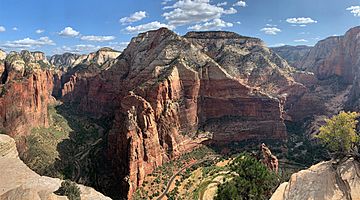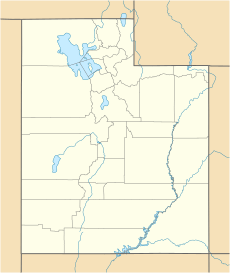Observation Point (Zion) facts for kids
Quick facts for kids Observation Point |
|
|---|---|

Observation Point seen from Angels Landing Trail
|
|
| Highest point | |
| Elevation | 6,507 ft (1,983 m) |
| Isolation | 0.12 mi (0.19 km) |
| Parent peak | Observation Benchmark (6708 ft) |
| Geography | |
| Location | Zion National Park Washington County, Utah United States |
| Parent range | Colorado Plateau |
| Topo map | USGS Temple of Sinawava |
| Geology | |
| Age of rock | Jurassic |
| Type of rock | Navajo sandstone |
| Climbing | |
| Easiest route | class 1 hiking trail |
Observation Point is a tall rock feature in Zion National Park in southwest Utah, United States. It stands at 6,507-foot (1,983 m) above sea level. This amazing viewpoint is made of a type of rock called Navajo Sandstone.
Observation Point is located at the northern end of Zion Canyon. It rises about 2,100 feet (640 meters) above the canyon floor and the Virgin River. Rainwater from the point flows into this river. The name "Observation Point" was officially given to this spot in 1934.
What is Observation Point?
Observation Point is a famous landmark known for its incredible views. From the top, you can see many other well-known features of Zion National Park. These include The Great White Throne, Cathedral Mountain, Angels Landing, and Cable Mountain. It's a perfect spot to take in the vastness of the canyon.
Hiking to the Top
One of the most popular ways to reach Observation Point is by hiking. There's an 8-mile round-trip trail that starts near the Weeping Rock area along Zion Canyon Road. This trail climbs all the way to the top. It's a challenging but very rewarding hike that offers stunning views along the way.
Weather at Observation Point
The best times to visit Observation Point are during spring and fall. The weather is usually mild and pleasant then. The area has a "cold semi-arid climate." This means it's generally dry, like a desert, but can get cold, especially in winter.
The region gets less than 10 inches (250 millimeters) of rain each year. Snowfall in winter is usually light, but it can make the views even more beautiful.
Images for kids
 | Kyle Baker |
 | Joseph Yoakum |
 | Laura Wheeler Waring |
 | Henry Ossawa Tanner |













